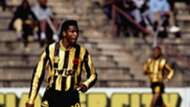
Both were influential to their nations’ Africa Cup of Nations success in the 1990s, but who was the superior player?
The size of an achievement is determined by its weight or significance, and for Nigeria and South Africa in 1994 and 1996 respectively, wining the Africa Cup of Nations brought relief as much as it brought elation.
After going 14 years without the continental crown, Stephen Keshi was captain when the Super Eagles finally ended their hoodoo at the showpiece in Tunisia. To many Nigerians, it was deserved too after near misses in 1984, 1988 and 1990 where they finished runners-up.
Keshi actually featured in those twin defeats at the hands of Cameroon in ’84 and ’88, so the win in Tunis at the twilight of his career was probably the universe rewarding him after heartaches in previous tournaments.
For another defensive stalwart in that period, it wasn’t an analogous path for South Africa’s Lucas Radebe, who was part of the Bafana Bafana side that reigned supreme two years after the West Africans won their second African title.
🇳🇬 Jay-Jay Okocha 🆚 Lucas Radebe 🇿🇦
Who has your backing? #ALCON pic.twitter.com/FsGxU0Vz0A
— Goal Africa (@GoalAfrica) April 23, 2020
The central defender didn’t falter at the last hurdle on two occasions like the 1994-winning skipper, but he had to fight personal and nationwide demons to rise to the acme of the continent.
Radebe suffered several setbacks in his formative years, while also having to grow up within the country dominated by racial segregation until the early 90s.

Bafana Bafana weren’t involved at the Afcon for nearly three decades due to apartheid, but the centre-back was a mainstay in the side that hosted and won the title in 96 and went so close in Burkina Faso two years later only to suffer defeat against Egypt at the final hurdle.
The pair of Keshi and Radebe played vital roles in their nations’ rise again to prominence two years in succession and their careers are peculiar in that they never won the biggest trophies for their clubs.
Still, Nigeria’s 1994 Afcon captain was one of the first African players who moved to Europe and created a path that players from future generations would tread, which earned him the ‘Big Boss’ nickname.
Keshi won two Belgian Cups with Anderlecht in the late-80s before triumphing in the league at the start of the new decade in 1991.
While the Big Boss enjoyed his biggest successes in the first-half of the decade, Radebe took over the mantle in the second half of the decade, which culminated in the southern African nation claiming their first Afcon title on their debut, with Nelson Mandela watching on.
The centre-half was to be signed by Leeds United and he overcame initial difficulty to then become a mainstay in the Peacocks side, which eventually led to being named captain of the side in 98/99.
Under the South African’s captaincy, the Whites finished fourth and third in 1999 and 2000 respectively, with a run to the semi-final in the Champions League in the latter truly highlighting the benefits of having Radebe as captain.
Even though they didn’t claim any titles in that period, Leeds threatened to disturb the applecart at the time and their rise was good for the English game…at least until financial realities set in.
The relative success enjoyed by the Afcon 96 winner trumps Keshi, who didn’t really make an impact in Europe’s premier club competition or the World Cup, another big stage where Radebe shone.
Despite South Africa failing to make it out of the group in 1998 and 2002, their captain’s performances were encouraging and demonstrated that the country could hold their own against the world’s finest. The match with Spain in the latter, where the centre-back put his neck muscles to use in briefly making it 2-2, saw the African nation win fans even though they fell 3-2 in the end.
While the Nigerian probably pioneered the influx of the continent’s centre-backs into Europe, he never really made his mark on the continent and on the world stage, feats the South African achieved in his career.
Keshi overcame setback after setback to lead his nation to the top of the continent while Radebe rose above apartheid, injuries and even being shot to do likewise, while also leading his nation to two World Cups in 1998 and 2002.
Both were two of the continents finest and ought to be celebrated for their respective contributions to football in Africa.

Be the first to comment